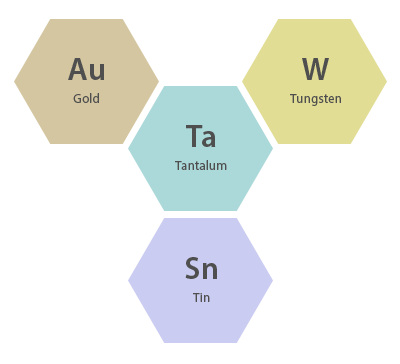Compliance
Conflict Minerals
Conflict minerals originating in the Democratic Republic of the Congo (DRC) or an adjoining country (hereinafter called “the covered countries”) have become a source of funding for armed groups, leading to human rights violations and environmental destruction while threatening to promote further conflict. The four minerals in question (tin, tantalum, tungsten, and gold) are widely used in electric and electronic products.
It is KEYENCE policy to refrain from the purchase of any parts, components, and materials that are recognised to contain conflict minerals.
Furthermore, KEYENCE has no intention to benefit or finance the armed groups responsible for human-rights violations in the covered countries. KEYENCE is engaging in efforts to eliminate conflict minerals while cooperating with suppliers, such as investigating supply chains using tools provided by the Responsible Minerals Initiative (RMI)(formerly CFSI), an organisation that promotes the responsible procurement of minerals.

Management of Chemical Substances in Products
Restrictions of chemical substances in electric and electronic products are spreading worldwide.
KEYENCE shares the procedures/rules with our suppliers, for management of chemical substances in products.
KEYENCE defines and shares a set of restricted substances in addition to the chemical substances that are regulated by the RoHS Directive and the REACH regulation in the European Union. KEYENCE promotes Green Procurement of the components and materials that we use in our products. KEYENCE is actively engaged in efforts to abide by all regulations set against using harmful chemical substances in our products.
KEYENCE contributes to a green initiative through the use of our products.
Working Toward the EU RoHS Directive
KEYENCE is eliminating hazardous substances (such as heavy metals) from our products in order to contribute to the protection of human health and global environmental recovery. KEYENCE is switching over to products that comply with the RoHS Directive.
RoHS Directive
Electrical and electronic equipment placed on the EU market must not contain restricted substances under the RoHS Directive.
Restricted substances under the RoHS Directive
Pb
Lead
Hg
Mercury
Cd
Cadmium
Cr6+
Hexavalent chromium
PBB
Polybrominated biphenyls
PBDE
Polybrominated diphenyl ethers
DEHP>*1
Bis(2-ethylhexyl) phthalate
BBP>*1
Butyl benzyl phthalate
DBP>*1
Dibutyl phthalate
DIBP>*1
Diisobutyl phthalate
- *1The specific phthalates which added by (EU) 2015/863. Most KEYENCE products will be subject to regulation from July 22, 2021, but we are gradually transitioning them now.
Employee Code of Behaviour
KEYENCE has built a system that requires all employees to regularly confirm our Corporate Policy and Business Guideline, which defines employee code of behaviour, in order to maintain an organisation that reduces the probability of abuse, harassment, or other such problems occurring. In addition, by proactively applying these judgement criteria in everyday operations, we work to ensure a thorough and intrinsic compliance with this code while seeking to improve awareness of what compliance entails.
FLAT ORGANISATION
KEYENCE values "what was said," not "who said it."
In order not to be conscious of the hierarchical relationship, KEYENCE has maintained a vibrant corporate culture in which all employees are empowered to contribute their opinions, regardless of role, age, career or position.
Rational decision making is our common sense, which leads to a higher probability of success in our work.
DISTINCTION BETWEEN BUSINESS AND PERSONAL MATTERS
We constantly emphasise the importance of making decisions from a business viewpoint as a means of sustaining our company. For this reason, the influence of interests unrelated to business, the acceptance of personal benefits on business, and personal use of company's assets are strictly prohibited.
FAIRNESS AND IMPARTIALITY
Fairness and impartiality are indispensable when it comes to acting properly as a corporation.
We have prohibited hiring relatives of executives and employees, and we have also prohibited the provision and acceptance of any gifts in business transactions. We consider these necessary rules for fairness and impartiality.
Respecting Human Rights
KEYENCE respects human rights, aims to create a workplace for employees to gain satisfaction from their jobs, and makes efforts to ensure that our business activities do not contribute to human rights violations, such as forced labour, child labour and human trafficking, including in our supply chain (The contract with suppliers includes the clause of elimination of discriminatory employment). We engage in corporate activities based on a high ethical standard with a recognition of the importance of human rights issues. In addition to regulatory compliance, in order to maintain a vibrant workplace climate (corporate culture), we have instituted guidelines within our Business Guideline to reinforce respect for the individual from many angles.
UK Modern Slavery Act
This is the statement according to the Section 54 of the UK Modern Slavery Act 2015.
UK Tax Strategy
For more information about our tax strategy please click here.
Procurement Guideline
KEYENCE provides Procurement Guideline to all suppliers, which requires them in our supply chain to respect worker's fundamental human rights, including the elimination of forced labor and discriminatory employment.
